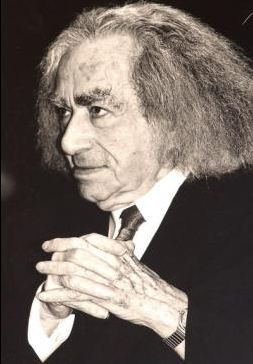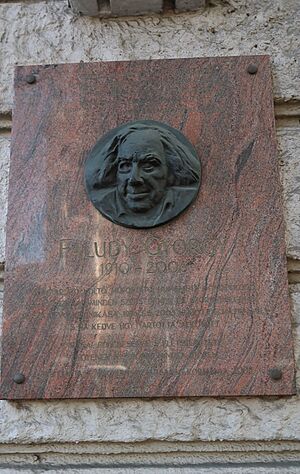György Faludy facts for kids
Quick facts for kids
György Faludy
|
|
|---|---|
 |
|
| Born | György Bernát József Leimdörfer September 22, 1910 Budapest, Kingdom of Hungary |
| Died | September 1, 2006 (aged 95) Budapest, Hungary |
| Resting place | Kerepesi Cemetery |
| Occupation |
|
| Language | Hungarian |
| Nationality | Hungarian |
| Citizenship | Hungarian, Canadian |
| Education | Fasori Gimnázium University of Vienna (1928–1930) Humboldt University of Berlin (1930–31) |
| Years active | 1937–2006 |
| Notable works | My Happy Days in Hell Translations of Villon's ballads |
| Notable awards | Kossuth Award |
| Spouse | Zsuzsanna Szegő (1953–1963) Katalin Fatime "Fanni" Kovács (2002–2006) |
| Partner | Eric Johnson (1966–2002) |
| Children | Andrew Faludy |
| Relatives | Alexander Faludy (grandson) |
György Faludy (born September 22, 1910 – died September 1, 2006), sometimes known as George Faludy, was a famous Hungarian poet, writer, and translator. He lived a long and eventful life, experiencing many changes in his home country and around the world. He is especially known for his powerful writings and his ability to translate important works into Hungarian.
Contents
Life Story
Early Years and Travels
György Faludy finished his schooling at the Fasori Gimnázium in Hungary. He then studied at universities in Vienna, Berlin, and Graz. During these years, he developed strong beliefs in freedom and individual rights, which he held onto throughout his life.
In 1938, because of his Jewish background and the political situation, he left Hungary for Paris. Later, he moved to the United States. During World War II, he served in the American military. He returned to Hungary in 1946 after the war ended.
Difficult Times and New Beginnings
In 1949, Faludy was unfairly accused of crimes and sent to a forced labor camp called Recsk. He spent three years there. Even in this difficult place, he continued to teach other prisoners about literature, history, and philosophy. After he was released, he earned a living by translating books.
In 1956, after the 1956 Hungarian Revolution, he had to leave Hungary again and moved to London. There, he became the editor of a Hungarian literary magazine.
Life in London and Toronto
While living in London, Faludy wrote his famous memoir, My Happy Days in Hell. This book was about his experiences in the forced labor camp. It was first published in English in 1962 and became very well-known outside Hungary. It was only published in Hungarian much later, in 1987.
In 1967, he moved to Toronto, Canada, where he lived for twenty years. He gave lectures at universities in Canada and the U.S. and continued to edit Hungarian literary journals. He became a Canadian citizen in 1976. Two years later, the University of Toronto gave him an honorary doctorate, and he often taught there.
Return to Hungary
In 1988, Faludy returned to Hungary. After the end of communism, his works, which had only been secretly shared during the Communist era, were finally published openly in Hungary. He released new collections of poems and many translations in the 1990s.
In 1994, he received Hungary's highest honor, the Kossuth Prize. In 2000, he published another memoir, After My Days in Hell, which described his life after leaving the labor camp. Faludy was also known for his interesting stories and his clever sense of humor. Many writers from different countries visited him to hear his tales.
Family and Companions
György Faludy had a son named Andrew, born in 1955, with his second wife, Zsuzsa Szegő. Zsuzsa passed away in 1963. His grandson, Alexander Faludy, born in 1983, is a priest and a writer.
For 36 years, Eric Johnson (1937–2004) was a close companion, secretary, translator, and co-author to Faludy. Eric was a ballet dancer and later a poet. He read Faludy's memoir and traveled to meet him in 1966.
In 2002, Faludy married Fanny Kovács, who was also a poet. They even published some poems together.
A Special Park in Toronto
In 2006, a memorial park was created in Toronto to honor György Faludy. It was designed by landscape architect Scott Torrance and is located near where Faludy used to live. The park has a bronze plaque with Faludy's portrait and a poem he chose, Michelangelo's Last Prayer, written in both English and Hungarian. This park helps remember his important contributions to culture.
His Works
Faludy's translations and rewritings of the ballads by François Villon made him very popular when they were first published in 1934. These works have been published about forty times since then. He also wrote several volumes of his own poetry, some of which were published in English.
His most famous work is My Happy Days in Hell (Pokolbéli víg napjaim). This memoir, first published in English in 1962, was also translated into French and German. It tells the story of his experiences in a forced labor camp and is a powerful account of his life.
Works Published in English
- 1962: My Happy Days in Hell; reissued 1985, ISBN: 0-00-217461-8; 2003, ISBN: 963-206-584-0
- 1966: City of Splintered Gods; translated by Flora Papastavrou
- 1970: Erasmus of Rotterdam. ISBN: 0-413-26990-6; 1971, ISBN: 0-8128-1444-4
- 1978: East and West: Selected Poems of George Faludy; edited by John Robert Colombo; with a profile of the poet by Barbara Amiel. Toronto: Hounslow Press ISBN: 0-88882-025-9
- 1983: George Faludy: Learn This Poem of Mine by Heart: sixty poems and one speech. ISBN: 0-88882-060-7; edited by John Robert Colombo
- 1985: George Faludy: Selected Poems 1933-80. ISBN: 0-8203-0814-5, ISBN: 0-8203-0809-9; edited by Robin Skelton
- 1988: Notes From the Rainforest. ISBN: 0-88882-104-2
- 2006: Two for Faludy. ISBN: 1-55246-718-X edited by John Robert Colombo
Works Published in Hungarian
- Jegyzetek az esőerdőből. Budapest. 1991. Magyar Világ Kiadó, 208 p.
- Test és lélek. A világlíra 1400 gyöngyszeme. Műfordítások. Szerk.: Fóti Edit. Ill.: Kass János. Bp. 1988. Magyar Világ, 760 p.
- 200 szonett. Versek. Bp. 1990. Magyar Világ, 208 p.
- Erotikus versek. A világlíra 50 gyöngyszeme. Szerk.: Fóti Edit. Ill.: Karakas András. Bp. 1990. Magyar Világ, 72 p.
- Dobos az éjszakában. Válogatott versek. Szerk.: Fóti Edit. Bp. 1992. Magyar Világ, 320 p.
- Jegyzetek a kor margójára. Publicisztika. Bp. 1994. Magyar Világ, 206 p.
- 100 könnyű szonett. Bp. 1995. Magyar Világ, [lapszám nélkül].
- Versek. Összegyűjtött versek. Bp. 1995. Magyar Világ, 848 p., 2001. Magyar Világ Kiadó 943 p.
- Vitorlán Kekovába. Versek. Bp. 1998. Magyar Világ, 80 p.
- Pokolbeli víg napjaim. Visszaemlékezés.
- Pokolbeli napjaim után. ISBN: 963-9075-09-4.
- A Pokol tornácán. ISBN: 963-369-945-2.
- Faludy tárlata: Limerickek. Glória kiadó. 2001.
- A forradalom emlékezete (Faludy Zsuzsával közösen). ISBN: 963-370-033-7
- Heirich HeineVálogatott versek Faludy György fordításában és Németország Faludy György átköltésében. Egy kötetben. Alexandra Kiadó. 2006.
See also
Archives
There is a collection of George Faludy's papers at Library and Archives Canada. The special reference number for these archives is R10125.
 | Georgia Louise Harris Brown |
 | Julian Abele |
 | Norma Merrick Sklarek |
 | William Sidney Pittman |


